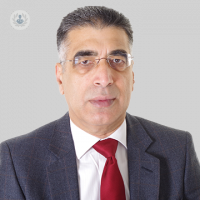Liver disease: can the liver repair itself after years of drinking?
Written by:The liver is an organ with the ability to regenerate, but after consuming excess alcohol over a long time, there is a stage in which this ability can become impaired or impossible. Dr Ghazanfar Ali has been treating alcohol related liver disease (ARLD) for many years, and here he explains the stages of ARLD, if the liver can heal itself and more.


What is alcohol-related liver disease (ARLD) exactly?
Alcohol is used as a drink to enjoy life, but many people may not be aware of the damage it can cause if consumed on a regular basis over a long period of time. If more than 14 units of alcohol are consumed weekly over the years, it can cause irreversible damage to the liver, even if the units are consumed over only two to three days a week.
What are the 3 stages of ARLD?
Alcohol causes liver damage in three stages.
- In the first stage, people develop fatty liver. This is an accumulation of fat in the liver cells which occurs due to alcohol being metabolised and the production of fat in the liver. It occurs readily in people who are overweight, sedentary and have an unhealthy diet.
- If one continues to drink, the second stage is alcoholic hepatitis. This is due to inflammation in the liver cells and at this stage, liver blood test results become abnormal. It can develop after many years of drinking or relatively early-on.
- The third stage is liver cirrhosis. It develops after many years of harmful drinking. In earlier stages after alcoholic hepatitis, liver cells start to die and this leads to scarring and fibrosis (excess tissue) of the liver cells. At this stage the liver starts to become stiff with reduced elasticity, forms nodules, its shape becomes distorted and the liver shrinks in size.
Can the liver repair itself after years of drinking?
Liver cells can regenerate if there is a single injury or trauma and if only some of the liver cells are damaged. If the liver injury occurs over the years with continuous prolonged damage, then cirrhosis develops and the damage becomes irreversible. Once cirrhosis has finally developed, the only treatment option is a liver transplant.
Is liver disease common in the UK?
Liver disease is the third leading cause of death in the UK and over 40 people die of the disease every day. Liver disease is now the biggest cause of death in those aged between 35-90 years old and since 1970 deaths due to liver disease have increased by 400%
ARLD, along with fatty liver and hepatitis C, is the most common cause of cirrhosis in the UK. ARLD accounts for 60% of all liver disease.
Can you offer any advice to avoid ARLD?
Prolonged and excess use of alcohol is what leads to liver damage. Drinking in moderation with two or more alcohol-free days a week should minimise the damage, and to be within safe limits, one should not drink more than 14 units of alcohol a week, whether male or female, and avoid binge drinking as it’s harmful to the liver.
However, alcohol consumption, even in moderation, may cause liver damage if a person is overweight, has diabetes, and/or an unhealthy lifestyle. For a person with these characteristics, even drinking less than 14 units may cause liver damage, hence to prevent ARLD, one needs to avoid excess use of alcohol and adopt a healthy lifestyle.
Dr Ghazanfar Ali is a leading gastroenterologist with many years of experience in treating liver disease. Don’t hesitate to visit Dr Ali’s profile and book a consultation.


